Often times we all would want to keep tabs on just how much food we’re eating and how they contribute to our health. Whether you want to effect weight loss, monitor your food intake or discover foods that are unsuitable for you, a food diary is the appropriate way to achieve it.
What is a food diary?
A food diary is a record or log of all your daily meals. It monitors the time they are eaten, the quantities of the foods and the balanced nature of the diet. It is a kind of food tracker that records your eating pattern. The contents of a food diary are a combination of factors that help analyze how efficient your meals are.
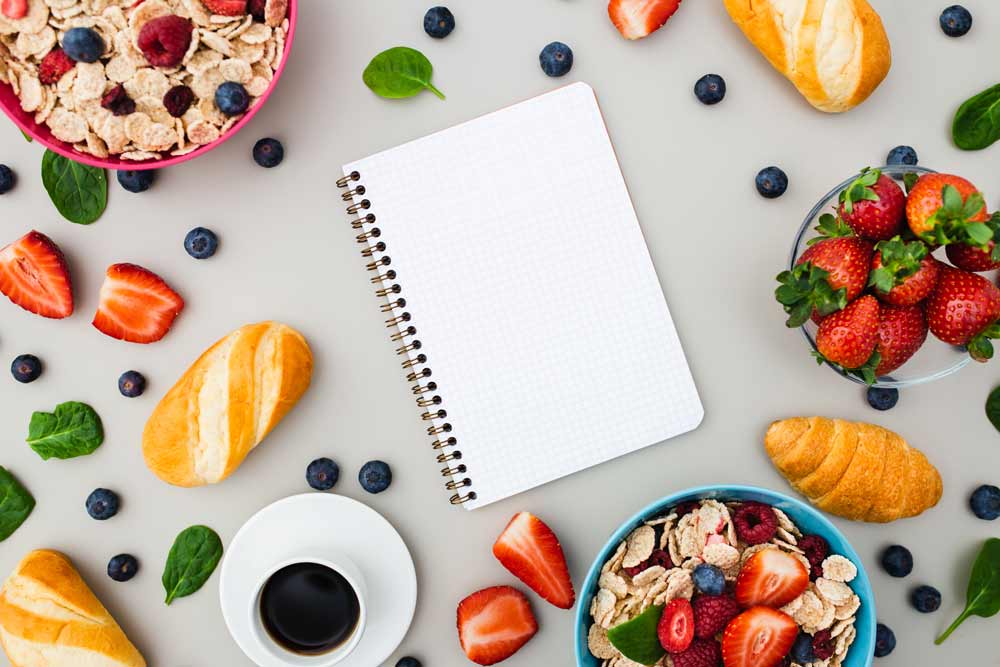
Things to keep track of in a food journal
A food diary usually contains the followings.
- The type of food eaten
- The quantity of food taken
- The time the food was eaten
- The place the food was eaten
- The mood at the time of eating
12 Impressive benefits of keeping a food diary
Sometimes it may be difficult or possibly too tedious to regularly put down every food or drink that you ate, but with the right motivation, this can be achieved. The motivation here comes in the form of benefits that a food journal can afford you.
1. Weight loss
This is one of the benefits of using a food diary. The diary helps you to keep track of all the foods eaten and helps you to know which foods are harmful to you. It will also point out all the harmful habits that you indulge in so you can cut down on them. Research has shown that persons who have food diaries tend to lose twice as much weight than those who did not. This will definitely be an interesting way for you to lose weight!
2. Hold yourself accountable to control your food intake
When you record and keep track of everything you eat, it makes you regulate whatever goes into your mouth, making you more accountable for your weight gain. Since every drink or snack is recorded, you become more self-conscious of the harm certain cravings cause, making you more responsible for what you actually eat.

3. Detection of allergic reactions
When you keep a food journal, it helps you record foods and how you feel after eating each of them. This could help you determine which of the foods you are allergic or intolerant to. For example, if you continually feel bloated or in pain or uncomfortable after taking milk, it is possible that you could be lactose intolerant. Some people react badly to nuts or foods that contain gluten. All these may not be easily detected because those foods are taken alongside others but with a food diary which makes you put down how you feel after a particular meal, it is easy to pick out when you are having an allergic reaction.
4. Eat healthily
Keeping a food diary helps you to see which areas of your daily meals need changes and what nutrients are lacking so you can include foods rich in them into your diet. It will also help reduce the amount of processed foods intake and encourage a well-balanced diet for you. A food diary will make it obvious when you are only eating foods rich in one nutrient and will help you choose foods rich in others so as to eat healthily and have a balanced diet.
5. Analyze your eating habits
A food diary helps you to learn about your eating habits. Whether you indulge in a heavy snack after meals or if it is late night eating, a food journal will help you see the pattern and make effort to break it. A food diary can help spot unhealthy habits and the triggers to these habits. For example, when you do not eat all day only to overeat at night. This is an unhealthy habit which is self-triggered by starving.
6. Keep track of your calories
A food diary helps to calculate how much calories you need in a day so that you can monitor your intake. This is for people who are keen on gaining weight healthily.
7. Record your food buddies
Usually when filling out your food diary, it is required that alongside the foods you eat and the quantities, you should record who you ate with; if you did not eat alone. The reason is because some people are likely to make you eat more than you usually do. This is not of their volition but it means when you are around these people, chances are that you will overeat. The food diary monitors this and gives you feedback which can help you change your food buddies.
8. Increase Awareness of your food intake
Consistent use of a food journal increases your self-awareness to the foods you are taking in. It makes you realize that at times you eat when you are not hungry, which could also indicate triggers.
9. Control your food intake
Keeping a food journal helps you exercise certain levels of self-control. Just knowing that you have to write everything you eat exactly deters people from sneaking a snack. It develops your self-control.
10. Compare your perception vs reality
A food diary will help you to compare your reality to perceptions about your diet. Sometimes we tend to over emphasize or exaggerate the parts of our diet that are healthy and ignore the rest. A food diary will show you how the unhealthy foods are rendering useless the healthy ones.
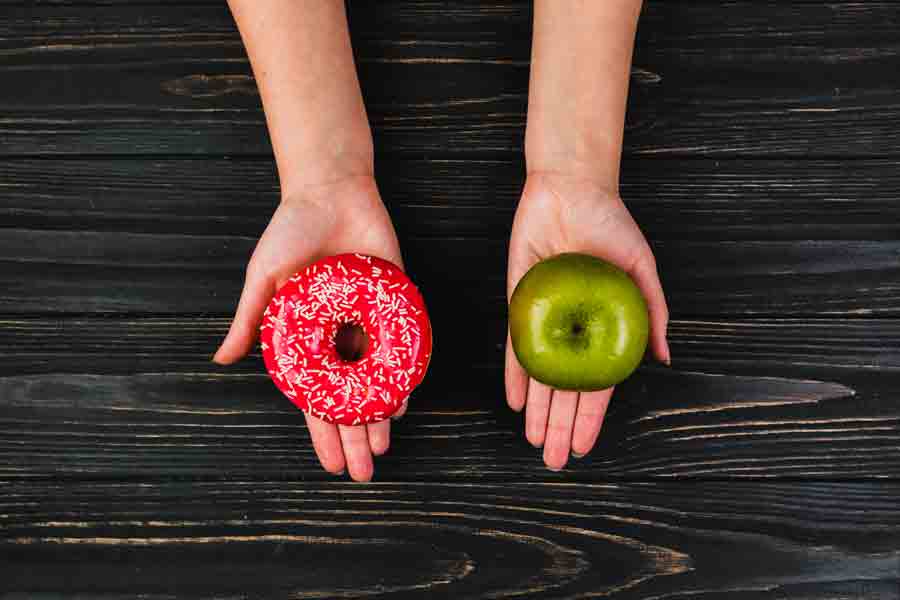
11. Motivate you to accomplish your goals
Keeping a food journal serves as a motivation to achieve the goals you have set when you look back to your first few weeks. It reassures you that your goals are attainable.
12. Diversify meals
A food journal can give you the level of creativity you need to try out new foods and combinations that are healthy. It enables you to plan your meals ahead and enjoy them while trying to lose weight.
6 Quick tips for getting started in food diaries
When filling out your food diary, it is important to always tell the truth. Be honest about it. You have nothing to worry when you write in a private food journal since this is not your coach or your doctor. Some people downplay or reduce the portions they fill in. This ruins the chance of regulating their diet. This has a greater effect on you and the goals you intend to achieve as your food diary cannot reflect your weight.
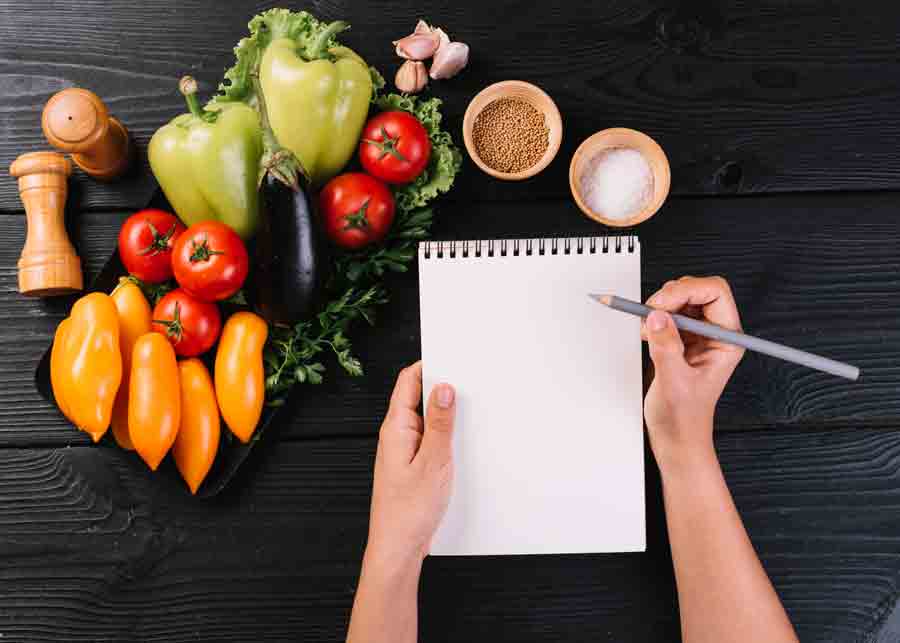
Here are a few tips on how to appropriately use a food diary.
1. Find a method that best suits you.
Whether it is a notebook or a diary software or an app, just make sure you are comfortable with it.
2. Choose an appropriate format.
When filling out a food diary, you need to decide what information is important for your goals. The basics are the type of food, time and quantity. You could add locations where you want to check out possible eating triggers and you could add emotions before and after the meal if you want to discover foods that you are intolerant of.
3. Decide on the time you would want to fill out your diary.
It is recommended to fill it every day but you can also choose to do it 5 times a week. It is also best if you fill it out immediately after the meal, which includes unplanned snacks and desserts.
4. Be specific.
If you are intent on knowing about your food intakes in precise amounts, it is thus advisable to record specific portions. Therefore don’t just record generally, be very detailed and precise such as the quantity. Be very thorough in your recordings. For example where there are toppings on your ice cream, it needs to be indicated or if your salad has dressing, that should be recorded as well. A casual bottle of beer could contain more calories than you know and should be recorded too.
5. Be consistent in your recordings.
The only way to achieve your goals is if you keep at it constantly.
6. Try to make journaling fun.
If it becomes tedious and stressful you are likely to quit so add a bit of fun to it!
Remember that the essence of the journal isn’t to remind you of your excessive eating habits or to call you out when there’s a slip up but to encourage you to take your eating habits seriously and carefully. It is pertinent to remember that no one is perfect.
Recap your food diary journey
After a few weeks of recording your meals and snacks, you will need to analyze the information in your diary.

- Check out the data for eating patterns that are similar. What foods always require a snack and those that keep you full throughout the day.
- Take note of how many snacks you have daily and how often these snacks are taken.
- Check if you eat heavily on weekdays or weekends. For some people, work has a great effect on their eating habits and others tend to eat more when they’re idle on weekends.
- Where your aim is to lose weight, also record your physical activities vis-a-vis the amount of calories you take per day. This will help you to know if you are burning as much calories as you are consuming so as to adjust appropriately.
- Keep track of your progress and your food expenses. Usually one would affect the other. Where there is progress, your expenses will either reduce or increase depending on whether you are cutting down on junk food or whether you are investing more in healthy foods.
Food diary examples and templates
A food diary when used efficiently, has been known to make tremendous changes to a person’s diet, life and health on the whole. Some templates are given below:
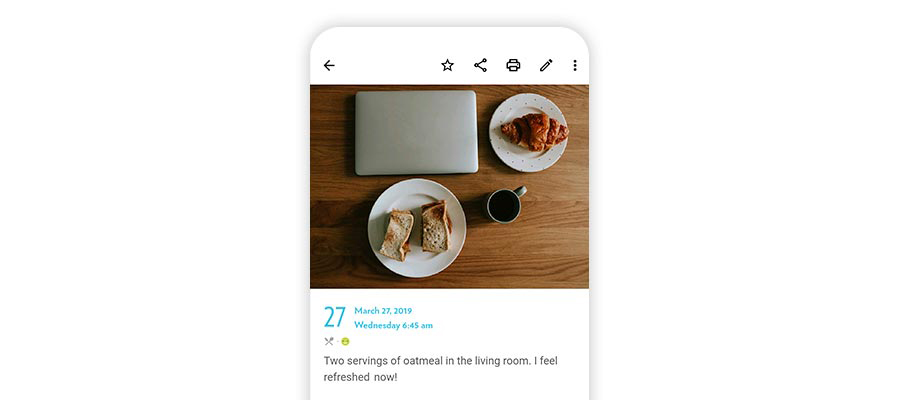 Example of Food diary using Journey app
Example of Food diary using Journey app
| Breakfast | Cup of coffee with 2 slices of toast in the kitchen. | Ate alone at 6:45am. |
| Lunch | A large Burger and mineral water in the office canteen. | Ate alone at 1:50pm. |
The above is a format which includes the type of food, the quantity, where it was eaten and with whom. This is a basic template which shows all the required information needed to completely monitor your food intake. Some templates could make provision for the way you feel before and after the meals.
| Breakfast | 6:45am | Two servings of oatmeal in the living room. | I feel refreshed. Energetic |
| Lunch | 1:45pm | Burger and mineral water in the office with my colleagues | I feel tired and really need to rest. |
| Snack time | 4:05pm | A cup of ice cream with my friend Brenda. | Brain freeze. Too much sugar. I feel bloated. |
The second template is more revealing as it requires you to state how you felt after eating. This helps to check foods that you are allergic to or which your body is intolerant with. This template also reveals snacking with a friend.
The essence of keeping an ideal food diary is not to make you feel bad but to inform you subtly of your food choices and to make you self-aware so that you can regulate it. There are some concerns that a food diary is limiting in the sense that it practically decides what you should eat at every point in time and no one wants to live like that. Everyone would like an opportunity to eat a variety of things and still be healthy without going through the hassle of keeping a journal. A food diary is a guide and merely persuasive, it shouldn’t be viewed as a problem or an estranged fitness instructor.
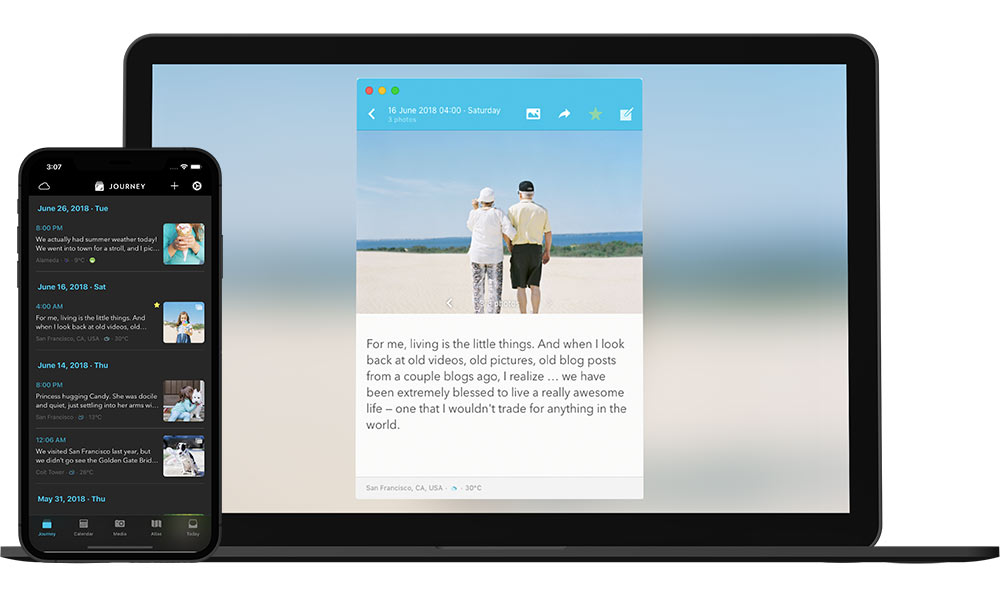
Truth is after you have consistently used a food journal for three months, the habit becomes a lifestyle and it will stop feeling like a burden and you would appreciate it more. As previously mentioned, you need to pick a format that best suits you. Either a book, notepad, computer or an app. An app that can help you keep track is the Journey app. Journey app can be a great food diary. Apart from the regular journaling, pictures of the food you are about to eat can be included in your entries which could spice up journaling and make it look fascinating, and more fun!
You can Journey and start your food journal today for a healthier you!